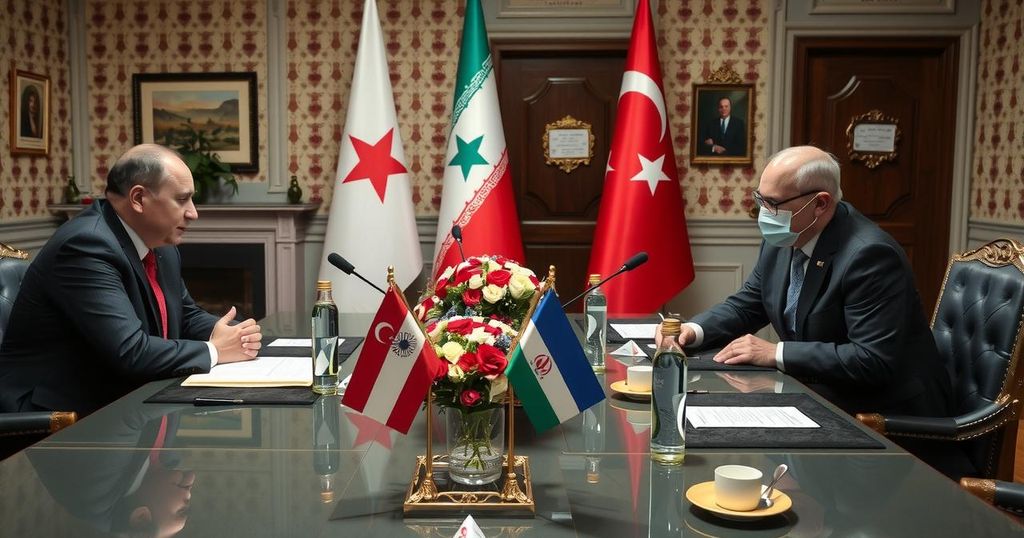World news
AGENCE FRANCE - PRESSE, ASIA, BASHA, BASHAR AL - ASSAD, CONFLICT, ERDOGAN, EUROPE, EUROPE/ASIA, FIGHTER JETS, HA, HAKAN FIDAN, HAMA, IRAN, MILITARY, REC, REUTERS, RUSSIA, SYRIA, SYRIAN CIVIL WAR, SYRIAN CONFLICT, SYRIAN NATIONAL ARMY, U. S. - BACKED SYRIAN DEMOCRATIC FORCES, UKRAINE, WAR
Lena Nguyen
0 Comments
Turkey, Russia, and Iran to Address Syrian Conflict Amid Recent Rebel Gains
Turkey, Russia, and Iran will meet this weekend in Qatar to discuss the implications of a recent Islamist rebel offensive in Syria. The Astana process, initiated by these countries, aims to find a political resolution to the civil war. Following significant territorial losses for Assad’s forces, discussions are critical amid escalating tensions and international interests in the region.
Turkey, Russia, and Iran are scheduled to meet this weekend in Qatar to address the implications of a recent rebel offensive that has shifted the dynamics of the 13-year-long Syrian civil war. This meeting will occur during the Doha Forum, a prominent gathering of international officials, scholars, and business leaders. Turkey’s Foreign Minister Hakan Fidan will convene with his Russian and Iranian counterparts as part of the Astana process, which was initiated to develop a political resolution to the ongoing conflict.
The Astana process, launched in 2017, involves Turkey, Russia, and Iran collaborating closely to stabilize the situation in Syria. While Russia and Iran have traditionally supported the Assad regime, Turkey’s position has been more complex due to its support for various rebel factions. Following a recent Islamist rebellion led by Hayat Tahrir al-Sham (HTS), which resulted in the seizure of major cities including Aleppo, concerns are mounting about the future of Assad’s government and the potential need for these nations to revisit their strategies.
Despite the complicated landscape, Russian President Vladimir Putin and Turkish President Recep Tayyip Erdogan have discussed the necessity for a resolution while stressing the importance of preserving Syria’s territorial integrity. However, Ankara’s apprehensions regarding Kurdish entities in northeastern Syria, which it associates with terrorism, continue to complicate Turkey’s stance. New clashes between Turkish-backed forces and the US-supported Syrian Democratic Forces (SDF) have erupted, adding another layer of tension within the region.
Moreover, both Russia and Iran now face significant challenges, with Russia distracted by its military actions in Ukraine and Iran under strain due to conflicts in Lebanon and Gaza. As the situation evolves, some experts question whether support from Russia and Iran will be sufficient for Assad’s return to power, especially following significant territorial losses to rebel forces.
U.S. involvement remains pivotal, with nearly 900 U.S. troops still present to assist the SDF against ISIS, and renewed military engagements have occurred between the SDF and Syrian government forces. U.S. officials emphasize that the upheaval in Syria primarily arises from Assad’s refusal to pursue a political resolution, with the potential resurgence of ISIS also a major concern for Washington.
In summary, the scheduled talks among Turkey, Russia, and Iran are crucial as these nations reassess their strategies following significant rebel gains in Syria. The complexities of the conflict, along with broader geopolitical tensions, suggest that any outcome from the Doha discussions could significantly influence the future trajectory of the Syrian crisis.
The Syrian civil war, ongoing since 2011, has drawn in multiple regional and international players, making the situation highly complex. The Astana process represents a diplomatic effort initiated by Turkey, Russia, and Iran to find a political solution to the conflict. Over time, the dynamics have shifted with changing allegiances, territorial control, and the emergence of new threats, such as the Islamic State militants and the Kurdish forces in the region. The recent escalation by Islamist rebels creates urgency for the major stakeholders to reassess their positions and strategies. Turkey, which has long harbored concerns regarding the Kurdish population in Syria, is particularly interested in maintaining regional stability, especially to avoid further refugee inflows into its territory, while simultaneously addressing its security concerns. Russia continues to balance its support for Assad with its operational commitments in Ukraine, and Iran is focused on maintaining its influence along the so-called Shiite Crescent, from Iran to Lebanon. The geopolitical landscape, therefore, remains fluid, with various factions vying for power and influence while other international actors, notably the United States, continue to be deeply invested in the region.
In conclusion, the forthcoming discussions in Qatar among Turkey, Russia, and Iran highlight the urgent need to respond to the new realities created by the HTS offensive and the complex interplay of regional politics in the Syrian civil war. As Assad’s regime faces unprecedented challenges, the positions of these key players will significantly shape the conflict’s immediate future, with implications extending to regional stability and international security. The ongoing risks from ISIS and the potential for further clashes underscore the criticality of a unified approach to finding a resolution to the crisis.
Original Source: www.voanews.com




Post Comment